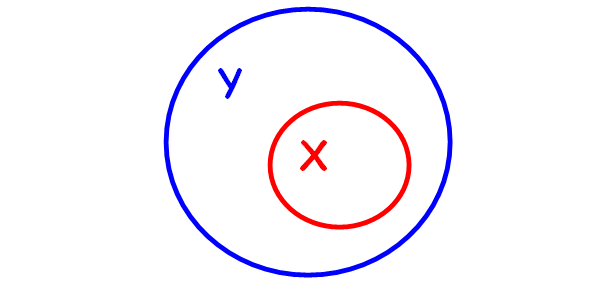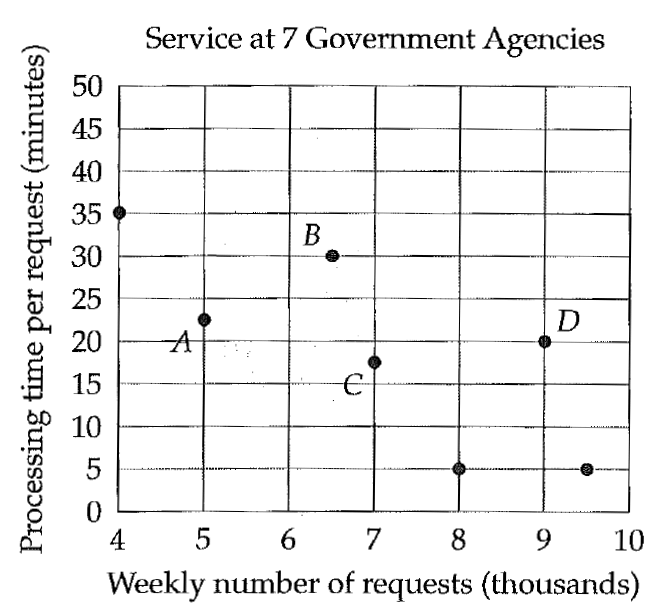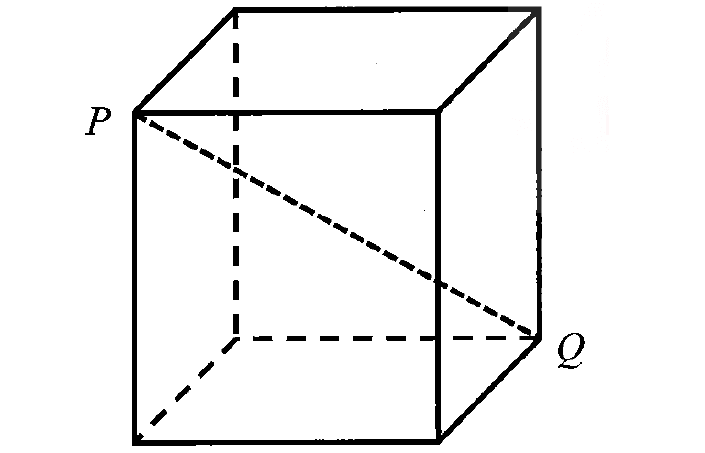SUBSET OF NULL SET
If null set is a super set, then it has only one subset. That is { }.
More clearly, null set is the only subset to itself. But it is not a proper subset.
Because, { } = { }.
Therefore, A set which contains only one subset is called null set.
Apart from the stuff "Subset of null set", let us know some other important stuff about subsets of a set.
Subset of a Set
A set X is a subset of set Y if every element of X is also an element of Y.
In symbol we write
x ⊆ y
Reading Notation :

Read ⊆ as "X is a subset of Y" or "X is contained in Y".

Read ⊈ as "X is a not subset of Y" or "X is not contained in Y".
Proper Subset
A set X is said to be a proper subset of set Y if X ⊆ Y and X ≠ Y.
In symbol, we write X ⊂ Y.
Reading Notation :

Read X ⊂ Y as "X is proper subset of Y".
The figure given below illustrates this.

Power Set
The set of all subsets of A is said to be the power set of the set A.
Reading Notation :

The power set of A is denoted by P(A).
Super Set
A set X is said to be a proper subset of set Y if X ⊆ Y and X ≠ Y.
In symbol, we write X ⊂ Y.
Here,
Y is called super set of X
Formula to Find Number of Subsets
If A is the given set and it contains n number of elements, we can use the following formula to find the number of subsets.
Number of subsets = 2ⁿ
Formula to find the number of proper subsets :
Number of proper subsets = 2n - 1
Cardinality of Power Set
We already know that the set of all subsets of A is said to be the power set of the set A and it is denoted by P(A).
If A contains "n" number of elements, then the formula for cardinality of power set of A is
n[P(A)] = 2n
Note :
Cardinality of power set of A and the number of subsets of A are same.
Null Set is a Subset or Proper Subset
Null set is a proper subset for any set which contains at least one element.
For example, let us consider the set A = {1}.
It has two subsets. They are { } and {1}.
Here null set is proper subset of A. Because null set is not equal to A.
Solved Problems
Problem 1 :
Let A = {1, 2, 3, 4, 5} and B = {5, 3, 4, 2, 1}. Determine whether B is a proper subset of A.
Solution :
If B is the proper subset of A, every element of B must also be an element of A and also B must not be equal to A.
In the given sets A and B, every element of B is also an element of A. But B is equal A.
Hence, B is the subset of A, but not a proper subset.
Problem 2 :
Let A = {1, 2, 3, 4, 5} and B = {1, 2, 5}. Determine whether B is a proper subset of A.
Solution :
If B is the proper subset of A, every element of B must also be an element of A and also B must not be equal to A.
In the given sets A and B, every element of B is also an element of A.
And also But B is not equal to A.
Hence, B is a proper subset of A.
Problem 3 :
Let A = {1, 2, 3, 4, 5} find the number of proper subsets of A.
Solution :
Let the given set contains "n" number of elements.
Then, the formula to find number of proper subsets is
= 2n - 1
The value of n for the given set A is 5.
Because the set A = {1, 2, 3, 4, 5} contains five elements.
Number of proper subsets = 25 - 1
= 32 - 1
= 31
Hence, the number of proper subsets of A is 31.
Problem 4 :
Let A = {1, 2, 3} find the power set of A.
Solution :
We know that the power set is the set of all subsets.
Here, the given set A contains 3 elements.
Then, the number of subsets = 23 = 8.
Therefore,
P(A) = {{1}, {2}, {3}, {1, 2}, {2, 3}, {1, 3}, {1, 2, 3}, { }}
Problem 5 :
Let A = {a, b, c, d, e} find the cardinality of power set of A.
Solution :
The formula for cardinality of power set of A is given below.
n[P(A)] = 2ⁿ
Here n stands for the number of elements contained by the given set A.
The given set A contains five elements. So n = 5.
Then, we have
n[P(A)] = 25
n[P(A)] = 32
Hence, the cardinality of the power set of A is 32.
Kindly mail your feedback to v4formath@gmail.com
We always appreciate your feedback.
©All rights reserved. onlinemath4all.com
Recent Articles
-
Digital SAT Math Problems and Solutions (Part - 153)
Apr 29, 25 12:18 PM
Digital SAT Math Problems and Solutions (Part - 153) -
Digital SAT Math Problems and Solutions (Part - 152)
Apr 28, 25 11:54 AM
Digital SAT Math Problems and Solutions (Part - 152) -
Digital SAT Math Problems and Solutions (Part - 151)
Apr 26, 25 11:18 AM
Digital SAT Math Problems and Solutions (Part - 151)

